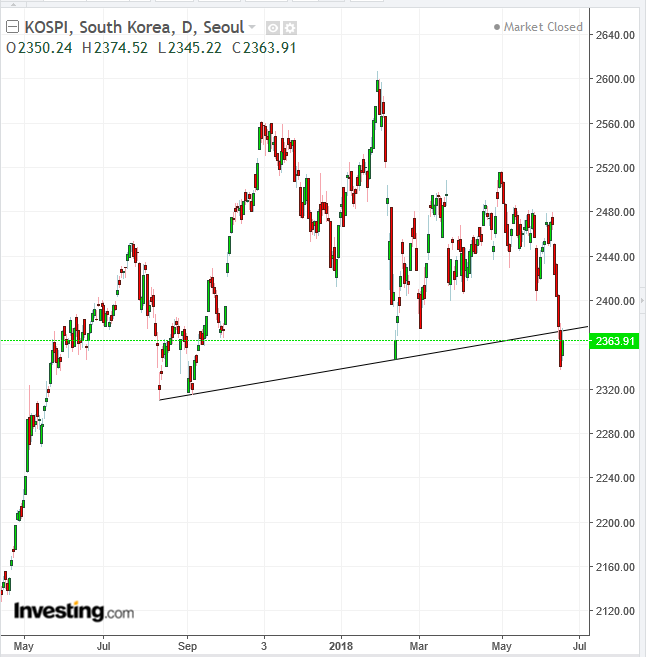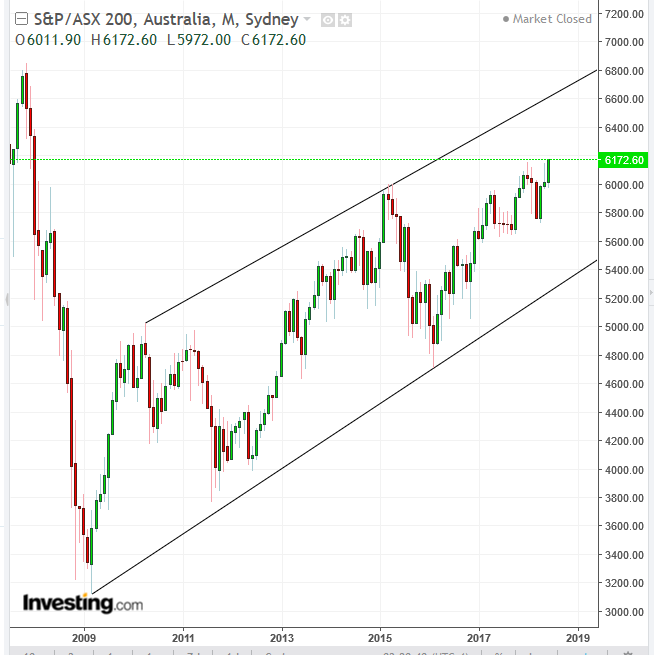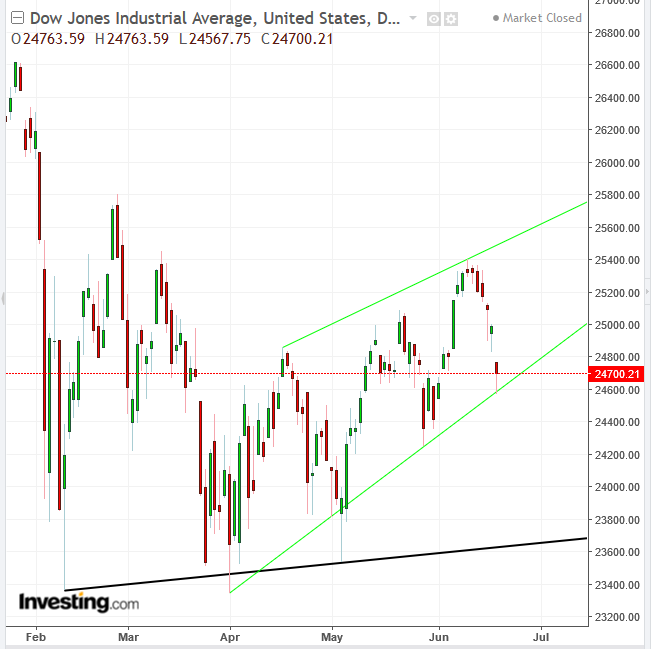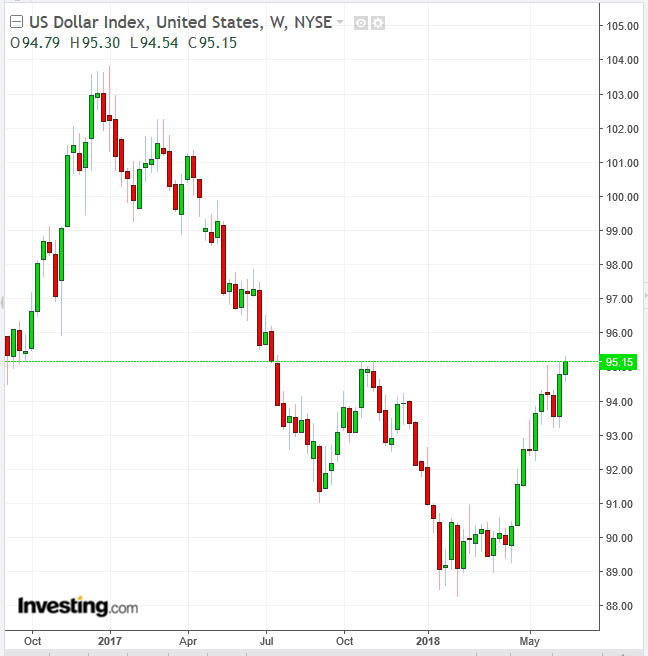-
Asian and European benchmarks rebound, but confirm overall downtrends
-
Australia's S&P/ASX 200 bucks the regional trend, reaches highest price level since 2009
-
US equities remain safely within uptrends
-
Oil stabilizes above $65 on stronger market confidence
-
Dollar index reaches 11-month high, weighs down on yen, gold, euro and pound
- Traders assign far more relevance to the US-China trade war than to the specter of an actual war with North Korea.
- Traders believe the trade war will curb the current synchronized global economic growth, pushing the supply-demand balance towards an overall selloff.
-
ECB President Mario Draghi, Reserve Bank of Australia Governor Philip Lowe, Bank of Japan Governor Haruhiko Kuroda and Fed Chairman Jerome Powell join a panel on central bank policy in Sintra, Portugal, on Wednesday.
-
Thailand, Philippines and Brazil central bank decisions are due on Wednesday.
-
Bank of England rate decision comes out on Thursday. Will the BoE meeting minutes hold the key for adjusting bets for a rate hike in August?
-
Also on Thursday: US jobless claims, New Zealand GDP, South Korea export data.
-
The Organization of Petroleum Exporting Countries (OPEC) meets in Vienna on Friday.
-
The STOXX Europe 600 gained 0.5 percent.
-
Futures on the S&P 500 climbed 0.2 percent.
-
The UK’s FTSE 100 climbed 0.7 percent.
-
Germany’s DAX advanced 0.5 percent.
-
The MSCI Emerging Market Index gained 0.5 percent, the first advance in more than a week and the largest increase in more than two weeks.
-
The MSCI Asia Pacific Index climbed 0.6 percent, the first advance in more than a week and the biggest increase in more than two weeks.
-
The Bloomberg Dollar Spot Index edged less than 0.05 percent higher, to the highest level in more than 11 months.
-
The euro dropped 0.2 percent to $1.1568, the weakest level in more than three weeks.
-
The British pound fell 0.1 percent to $1.3156, the weakest level in about seven months.
-
The Japanese yen slipped 0.1 percent to 110.19 per dollar.
-
The Turkish lira sank 0.4 percent to 4.7615 per dollar, the weakest level on record.
-
The yield on 10-year Treasuries gained one basis point to 2.90 percent, the first advance in a week and the biggest advance in more than a week.
-
Germany’s 10-year yield also climbed one basis point to 0.38 percent, the first advance in more than a week.
-
Britain’s 10-year yield increased less than one basis point to 1.283 percent, the first advance in more than a week.
-
Italy’s 10-year yield dropped one basis point to 2.549 percent, the lowest in more than two weeks.
-
West Texas Intermediate crude gained 0.6 percent to $65.48 a barrel.
-
Gold lost 0.1 percent to $1,273.71 an ounce, the weakest level in six months.
-
Brent crude gained 0.5 percent to $75.46 a barrel.
Key Events
Global equities rebounded on Wednesday, as European indices and US futures on the S&P 500, Dow and NASDAQ 100 took their cue from Asian gains.
The previous US session, which saw local indices bounce back from intra-session lows, showed that investors were already on track to find some stronger footing after the quick deterioration of US-China trade relations sparked widespread panic selling in Asia and Europe on Tuesday.
Today, yields on 10-year US Treasurys stabilized around 2.9 percent, and the dollar continued to inch higher.
Does this mean investors can expect a sustained stock rally across global markets? We doubt it, as Asian and European indices have already undergone several reversals. We consider today's rally nothing more than an upward correction within a downtrend.
US majors, however, remain safely within uptrends, and we expect shares will post higher prices later today.
The pan-European STOXX 600 opened in the green, finally halting a three-day slide, as most regional exchanges and sectors were posting gains. Technically, the session low seen on Tuesday formed a second, lower trough than the 382.14 price formed on May 31. This completed the peak and trough succession required to establish a trend.
The downtrend in the continental benchmark had already become clear during Monday trade, when prices crossed markedly below the uptrend line since March 26. The price move also confirmed the downtrend line since January 23. Bulls would have to drive prices above 400.00 to reverse course.
Earlier, during the Asian session, regional indices also attempted a recovery, though the supply-demand balance suggests it may be too little too late to avert a sharper price correction.
Japan's TOPIX turned a 0.9 percent drop into a nearly 0.5 percent advance. The rally was led by growth stocks in the consumer sector, while risk sectors such as materials—the hardest hit by trade uncertainties—and financials retreated. Buyers remembered the last time that prices had rebounded from around the 1730.00 level to 1800.00 in the two weeks between May 30 and June 13, rallying over 4 percent. On the other hand, the index also posted a trough lower than in May, potentially signaling a trend reversal.
China's Shanghai Composite also bounced off the session low, negative 1.2 percent, sealing a 0.4 percent gain. Technically, after obliterating a line of demand at the 3000.00 level, a support since January 217, mainland Chinese shares are in a clear downtrend.
Hong Kong's Hang Seng climbed 0.95 percent, ending a four-day, 5.2 percent selloff. Technically, however, the 2.75 percent plunge the index posted on Tuesday completed a consolidation, suggesting a resumption of the double-digit correction seen in February, as nervous sellers lower their prices to find buyers.

South Korea’s KOSPI leaped 1 percent, helped by gains in SK Hynix (KS:000660) (+4.3 percent), Samsung Electronics (KS:005930) (+0.3 percent) and steelmaker Posco (KS:005490) (+0.15 percent). The upbeat performance of these large-cap stocks—all heavily dependent on overseas markets for growth—and in particular the share rebound seen in Posco, the world's third-largest steel producer, underscore remarkable investor optimism in the face of US President Donald Trump's strategic tariff restrictions on the commodity.
However, after falling to the lowest price since September 2017 and thereby completing a conspicuous, full-year, Complex H&S top on Tuesday, the South Korean benchmark showed that:
The price gains seen today fell short of the index top’s neckline.

Australia’s S&P/ASX 200 was once again the regional winner, as 2 percent gains in financials shares helped the Aussie index jump 1.15 percent. Technically, the price withstood yesterday’s powerful shooting star and held onto all its gains, as it traded at the top of the session. As well, it reached the highest level since January 2008, as demand absorbed a line of supply at the 5150.00 level since the beginning of the year, confirming the long-term uptrend since February 2009.
Global Financial Affairs
While global selling seems to have slowed down, the fact that all major Asian stock benchmarks (apart from the S&P/ASX 200) and Europe’s STOXX 600 completed a bearish pattern paints a dismal outlook for non-US stocks.
Conversely, US majors have fended off most geopolitical headwinds and, on a technical level, remain well above their uptrend lines since the February low.
Despite the fact that the Dow Jones Industrial Average hit its sixth straight loss on Tuesday—its longest slump in over a year—and the S&P 500 dropped the most in three weeks, the two indices closed well off their intra-day lows, in a clear sign that there's no shortage of investors eager to buy the dip.

Even the Dow, whose listed mega-cap companies are particularly sensitive to trade tariffs, has managed to bounce off the bottom of the rising channel since April, closing more than 5 percent above the previous February 23360.29 trough.
If anything, since the global trade war saga started to unfold earlier this year, major US stock averages rebounded within days after each trade policy announcement, making those cheaper trades very profitable. Until that pattern breaks, we can expect traders to continue to buy into dips.
In other news, the price of oil managed to recover to above $65 a barrel, even as Iranian officials warned that OPEC members may fail to agree on output limits when they meet at the end of the week in Vienna. Iran, recently hit by the reinstatement of US sanctions, is fighting its own battle to ward off a supply pick up from other oil-producing countries.

The dollar is on track for its highest close in 11 months as it continues to gain ground for the third consecutive session. USD gains are weighing down on the euro, the pound and the yen. Meanwhile, gold slipped lower for a second day, after the stronger dollar pushed it lower on Tuesday despite the global equity selloff.
The onshore yuan edged higher after the People’s Bank of China set its daily reference rate at a higher level than forecast by both analysts and traders.
Shares from developing nations stocks also climbed on Wednesday, trimming the heavy losses they suffered on Tuesday when escalated trade tensions added to an increased outlook for faster US interest rate hikes. Indonesian stocks were the regional laggards, as traders returned after a holiday. The Turkish lira fell again ahead of an election this weekend.
Up Ahead
Market Moves
Stocks
Currencies
Bonds
Commodities
